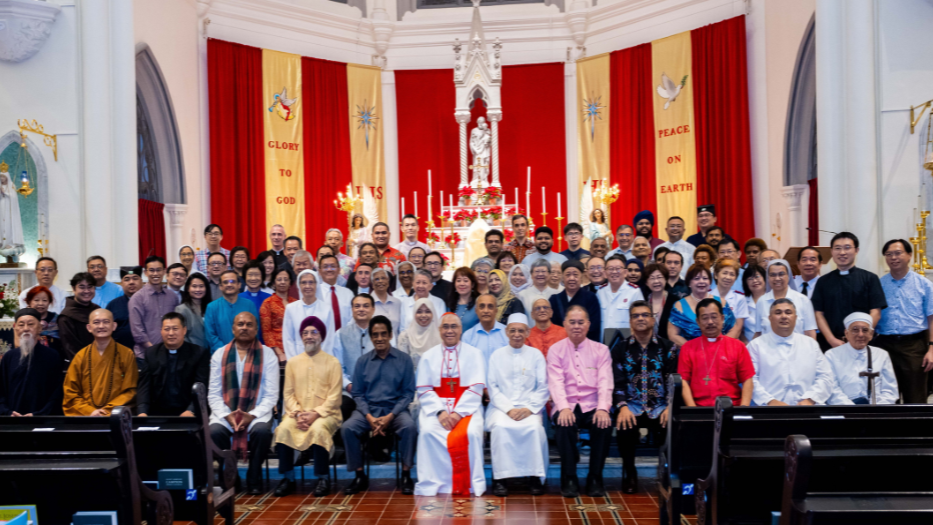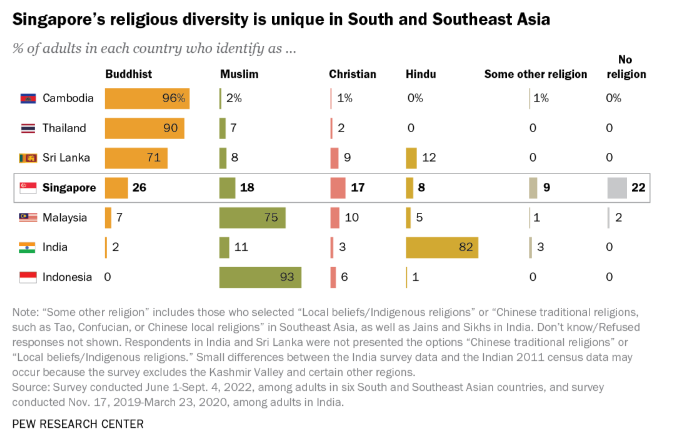The Untold Secret to Workplace Wellness: Religious Diversity

In response to Singapore Prime Minister Lawrence Wong’s call for employers to take an active role in supporting the mental health of their staff, it’s time to explore one of the most overlooked yet impactful elements of well-being—religion and spirituality.
As Singapore moves forward in addressing workplace mental health, one key question arises: are we doing enough to allow employees to bring their whole selves, including their faith, to work?
Organizations like Gallup have found that spirituality can boost mental resilience, but there's been a shift in how we talk about this. In a multicultural and religiously diverse nation like Singapore, recognizing and embracing religious diversity in the workplace isn’t just a matter of tolerance—it’s essential for safeguarding mental health.

Why Religion and Mental Health Are Connected
Gallup’s recent report on Faith and Wellness revealed a compelling connection between religious involvement and improved mental health. People who actively engage with their faith tend to report higher levels of optimism, stronger social connections, and greater emotional resilience. The report identifies several factors where religion can positively influence well-being:
- A Sense of Purpose: Religion offers individuals a framework to make sense of challenges, fostering emotional stability.
- Community Support: Faith-based communities provide much-needed social connections, reducing loneliness and isolation.
- Meaningful Engagement: Religious teachings encourage civic engagement, offering individuals a sense of belonging and purpose.
It’s clear that for many, religion is more than a set of beliefs—it’s a source of emotional strength and mental well-being. Yet in workplaces, the conversation around religion remains awkward or avoided altogether.

Singapore’s Religious Diversity—and the Workplace Disconnect
Singapore is one of the most religiously diverse countries in the world, with a rich tapestry of faiths: 26% Buddhist, 18% Muslim, 17% Christian, 8% Hindu, and 6% practicing Chinese traditional religions. Meanwhile, 22% of the population identifies as having no religion.
This diversity is deeply embedded in Singapore’s culture, and the country has made significant efforts to promote religious harmony through its national education system. Our national education system has done a commendable job instilling respect for different faiths, fostering a sense of religious harmony among Singaporeans from a young age.
But this same inclusivity doesn’t always extend into the workplace. Add to the fact that >40% of the workforce is made up of expatriates, it's fair to say there is a fair amount of volatility and disconnect.
While we’re increasingly comfortable discussing race and gender diversity at work, religion is often left out of the conversation. Employees may feel uncomfortable sharing their faith for fear of being misunderstood or facing stigma. Yet, for many, their faith is an integral part of who they are—it's the foundation of their mental and emotional well-being.
If we truly want to create inclusive workplaces that support mental health, we need to move beyond superficial diversity initiatives. It’s time to make room for faith in the workplace.

Religion vs. Spirituality: What’s the Difference?
There’s an important distinction between religion and spirituality, even though people often use these terms interchangeably. Religion is typically tied to organized practices, communal activities, and a belief in transcendence—a higher power or divine force that gives life meaning. This belief in transcendence is central to religion, offering followers a sense of connection to something larger than themselves.
On the other hand, spirituality is more individualized. It might involve personal practices like meditation or connecting with nature, but it’s not necessarily tied to a higher power or structured community. Spirituality can be deeply meaningful for some, but it doesn’t always offer the same sense of belonging or emotional stability that organized religion provides.
In today’s secular world, spirituality is often seen as more inclusive and acceptable, especially in workplaces. But companies need to understand that while spirituality can be a powerful tool for personal peace, it doesn’t always align the same spectrum as religion. Both can play important roles in supporting mental health, but they’re not interchangeable.

How Can Singapore’s Firms Support Mental Health Through Religion and Spirituality?
There’s a huge opportunity for companies in Singapore to better support their employees’ mental health by fostering an inclusive environment for both religion and spirituality. Here are some practical steps businesses can take:
1. Create Interfaith Employee Resource Groups (ERGs)
Set up interfaith ERGs where employees from different religious backgrounds can share their experiences, organize events, and build understanding. These groups can also host interfaith dialogues and celebrations, helping to foster mutual respect.
For example, companies like Accenture have successfully implemented interfaith groups, which have become a platform for employees to connect on a deeper level.
2. Offer Holistic Wellness Programs
Incorporate spirituality into your wellness programs by offering things like meditation or mindfulness sessions. You can also create quiet rooms for reflection or prayer, open to people of all faiths.
This approach allows employees to practice their faith or spirituality during the workday, promoting mental peace and well-being.
3. Introduce Religious Diversity Training
Make religious diversity training a part of your onboarding or professional development. This helps raise awareness of different faiths and teaches employees how to create an inclusive, respectful workplace.
Such programs can also help expatriates from different religious backgrounds feel more welcome and understood, at the same time, invite their embrace of our religious diversity.
4. Provide Flexibility for Religious Observances
Be flexible with work schedules to accommodate religious practices. This could mean offering time off for religious holidays, adjusting work hours for prayer, or allowing employees to take breaks for fasting.
Showing flexibility in these areas helps employees feel that their beliefs are respected.
5. Encourage Open Dialogue and Safe Spaces
Create safe spaces where employees can talk openly about their beliefs without fear of judgment. Encouraging these conversations, led by trained facilitators, helps break down barriers and fosters a culture of inclusion.
Leadership should model this openness, showing that it's okay to talk about religion in a respectful and inclusive way.
By taking these steps, companies in Singapore can create an environment where employees feel comfortable bringing their whole selves—including their faith or spirituality—to work. This not only supports mental health but also fosters a more engaged, productive workforce. When employees feel seen, valued, and respected for who they are, it’s a win-win for both the individual and the organization.
This article first appeared on LinkedIn Article on Oct 09 2024.
